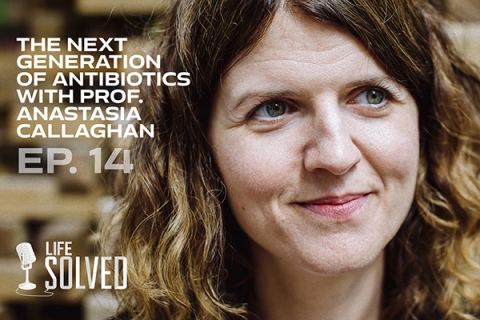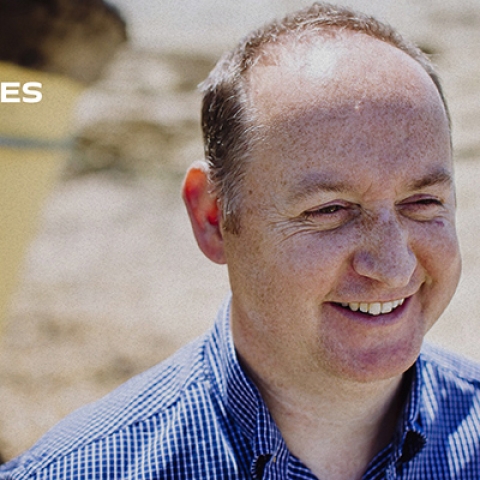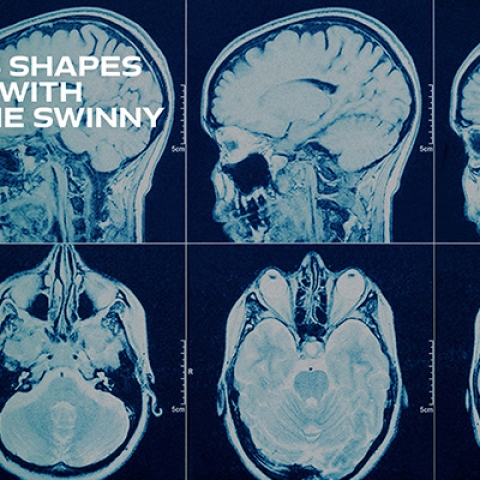

Professor Anastasia Callaghan talks about her team's effort in fighting antimicrobial resistance
15 min listen
Antibiotics have transformed healthcare. They mean that life-threatening illnesses can now be treated with ease, but resistant bacteria are a worrying prospect. That's why Professor Anastasia Callaghan's been exploring the inner mechanisms of bad bacteria to find out if further innovations can stop them multiplying in the first place.
You can listen to Life Solved on all major podcast players, whether via Apple, Spotify, Google Podcasts or other apps. Just search for 'Life Solved' and press the subscribe button.
You can't have modern medicine without antibiotics because you can't have surgery... All your chemotherapies impact immunity. I think it would be good if we could find a way to not get the resistance coming back.
Professor Anastasia Callaghan, Professor of Biochemistry and Molecular Biophysics
Episode transcript:
Narrator: You're listening to Life Solved from the University of Portsmouth. In this programme, we hear from brilliant researchers and scientists about the world changing work they're doing right here in Portsmouth.
Narrator: We know what a fundamental role antibiotics play in modern health care. Without antibiotics, modern medicine would be full of risk. Easy to treat infections could be life threatening, and human and animal life would be a lot more precarious. But the might of modern medicine is at risk. Today, I'm hearing about how research taking place at Portsmouth is diving into the very mechanics of how certain bacteria work so that we can limit the spread of diseases before antibiotic resistance occurs.
Anastasia Callaghan: We're trying to understand molecules that are important in antibacterial resistance so that we can have the next generation of antibiotics.
Narrator: We'll also hear how the techniques being used are opening up new ideas for solving other global problems.
Anastasia Callaghan: I think it's important to be targeting the global challenges. And I think as you get into it and you start to understand things and switches at the molecular level, you can see broader applications.
Narrator: Under the magnifying glass today, the research that could change our understanding of how diseases spread and how we fight them. I spoke to Anastasia Callaghan about some mysterious microbial mechanisms.
Narrator: Imagine a world without antibiotics. For millennia, humans have used naturally occurring substances to treat infections but in the 20th century, everyday life threatening infections became straightforward to treat. Today, international antibiotic use is accelerating over the decades. Without them, surgery or chemotherapy would carry massive risks, and infection could make you very, very ill. And everyday illnesses could mean life or death. But without managing the use of antibiotics worldwide, we are heading for big resistance problems.
Narrator: Anastasia Callaghan is Professor of Biochemistry and Molecular Biophysics. She's tackling the problem of antibacterial resistance by exploring the very manner in which bacteria behave.
Anastasia Callaghan: There's loads of quotes about the threat, the World Health Organisation and the global concern that it poses. So we said you can't have modern medicine without antibiotics because you can't have surgery. You're always on prophylactic antibiotics, aren't you, to make sure you don't get any infections. All your chemotherapies that impact immunity. So, again, those are very vulnerable people and they're undergoing that and all on prophylactic antibiotics. Modern medicine would just not exist without an ability to be able to keep on top of these things. But I think it would be good if we can find a way to not get the resistance coming back though.
Narrator: Anastasia and her team believe the key to tackling antibiotic resistance for good lies in a better understanding of how they work in the first place. We need to know how they fight bad bacteria and also how bacteria fight back.
Anastasia Callaghan: When you have an antibiotic killing off your bacteria they'll try and change/mutate their genomes in order to fight back and survive. So there's mechanisms by which they are changing, becoming resistant to the antibiotics we have, and so still causing the infections. So it's about finding different strategies and different ways we can disarm them. And so we're looking at those in relation to colorism, that is one of them that we're looking at that system. And with regard to a veterinary medicine pathogen as well in pigs because obviously, it's equally applicable to animals. So they're very different bacteria with very different mechanisms that make them nasty and so that's why you have to look at slightly different ways that you can manipulate them. But the idea is there's some commonality in terms of the approach we're taking.
Narrator: Antibiotic resistance is an international problem, but in some specific cases, diseases for which are existing treatments are no longer as effective are resurging. And in some cases an urgent global need means vital research work can get the support it needs.
Anastasia Callaghan: Funding became available because there was the earthquake in Haiti and there was a cholera outbreak. And then I think there was another one in Africa and it became very topical of these like mass situations where you're getting resistance and these poor people in these extreme circumstances are dying. And you need something where if you were going to do mass chemotherapeutics, so mass giving drugs to everybody, that's a great way to get resistance. It's almost one of the infections you would really want this approach to work for because resistance is a nightmare, isn't it, in an earthquake zone and everyone contaminated water and everybody goes down with it and suddenly you've got resistant bacteria. So the current set of antibiotics won't work, but hopefully, if there's any other disasters like that we'll be further down the line and well placed when these kind of situations happen.
Narrator: Anastasia's goal is to deepen our understanding of how bacteria operate and importantly interact in order to tackle the problem.
Anastasia Callaghan: And it's at the different life cycles of the bacteria. So, for example, once it's, like cholera, once it's into you, it will then turn on at a certain temperature, it will turn on things to colonise the gut. And then at that point, once it's reached a certain colonisation level, the bacteria will like talking to each other and said, oh, we need to now release again. And that's what the toxins come out to give you the diarrhoea, to get back into the waterways, to reinfect someone else. It's about trying to look at the mechanisms that have already been targeted. Lots were discovered by faking it back in the 1920s. We didn't know DNA, we didn't know anything about. But, you know, we just found all of this, you know, I mean, penicillin. It's just, you know, oh, it kills the bacteria! We understand now how that works. And so there's obviously lots of modifications and different things that have been done to try and exploit different pathways. And so really, it's about looking at other pathways now we understand all the genetics and everything like that. Of the bacteria, can we target any of them? And that we can understand more of the microbiology because that's where we are now with our science. And so we can do that.
Narrator: Anastasia's approach to the disease pathogens is – to put it in non-technical terms – to play around with them. The microbiologists are adapting the systems for specific scenarios and then learning how the disease spreading mechanisms work.
Anastasia Callaghan: It is a step change in terms of our ability to be able to analyse this work, analyse this data and move forward.
Narrator: If they can find a way to prevent bacteria communicating, the idea is that we might have an answer on how we can prevent certain diseases from colonising full stop. But this work is so deep they've got it down to specific molecules.
Anastasia Callaghan: We're trying to understand molecules that are important in antibacterial resistance so that we can have the next generation of antibiotics. So you have good bacteria and bad bacteria. So good bacteria in yoghurt, keep your gut happy and bad bacteria that make you poorly, give you chest infections, nasty cholera and things like that. If we can understand the difference between those bacteria, what makes them nasty? What are those molecules that are turned on to turn them into nasty bugs? Then we can essentially turn those off and therefore those bugs are then not harmful to us. It doesn't make them good, but it doesn't make them harmful. So the idea is that your body would just clear that bacteria, because it's just inert. You don't have antibiotic resistance because you're not killing it. So there's no selective pressure.
Anastasia Callaghan: DNA makes a molecule called RNA and then RNA kind of provides that information and becomes made into protein. So that's kind of central dogma, molecular biology, DNA, RNA to protein. So what we're finding is there's lots of control at the RNA level. So we're trying to modify and manipulate with artificial RNA molecules as to whether they get made into protein or not, because if we can prevent them being made into protein and they're the nasty toxins, then there's your just switch. So your stopping it being made. So we're stopping it at that RNA level. The switch is an artificial kind of 'druggy' type molecules that turn things on and off. You might have heard on the news about Huntington's disease and Huntington's gene, a company coming up with basically this. This is analogous to what we're doing, but this is in humans for human disease. But these are an analogue molecules as drugs. And so then basically it prevents the Huntington's gene being turned into the protein which causes Huntington's disease. And these are very, very novel-like drugs to be these kind of analogues. These are RNA analogues. But ours is very much in the switch context.
Narrator: So ultimately, being able to turn off the chemical switch that causes certain proteins being made means that you can stop new bugs being made. That means you not only limit the spread of disease in the first place, in some cases it could be done before antibiotic resistance even becomes a problem. The challenge seems to be that every disease is unique.
Anastasia Callaghan: The more we understand about, the more we realise how unique they are. So in some respects, there would be specific to that type of bacteria. And that is very nice because obviously, that prevents any chance of resistance because if you're turn off a specific mechanism in a specific bug, you haven't got others just like randomly fighting back or anything else, you know. So because of the ways they turn on their nasty pathways, we're finding they are quite unique. So there's common processes, but at the genetic level they're different.
Narrator: Anastasia's work may focus on the detail of one pathogen at a time. But what's the potential to take a new approach to other diseases with the methods that she's developing?
Anastasia Callaghan: Cancer's a really complex disease and there were so many different types that it may well be that for one type, that's OK. But I honestly don't know. You've got, like, your blood cancers I'm sure are very different to your tumours. The processing bugs is much more simple in humans. There's a lot of processing that RNA and, you know, makes it much more complex. That's not to say the more we learn about it, there may be, you know, things that you can move across and look and apply. And obviously, it does work in eukaryotic cells to a certain context because they've got a drug on it. So there obviously is potential in certain domains. But I know our stuff can help those patients because I know a lot of them are on prophylactic antibiotics. And, you know, that's really important in order to keep them well because they're just very susceptible because it impacts their immunity. Just just like when you have surgery and things. If we can get this approach to work, it still protects our modern medicine.
Narrator: And it's not just about protecting human health and medicine. Portsmouth microbiologists have been exploring a pathogen that targets pigs' respiratory systems. The ultimate benefit of this will be to protect animal health, food security and economies. The next question will be how to apply the researchers' findings safely in such a carefully regulated industry.
Anastasia Callaghan: So again, it's something which spreads really easily because obviously the way they keep pigs and it's obviously a massive financial implication in terms of, you know, husbandry, the bacon industry because of the way lots of them are together. Again, you want something which you can give and not get antibiotic resistance because you want to get your whole... do you call them herds? I don't know. It's a very different bacteria because once one gets it transferred very quickly. It affects their respiration and ultimately they die.
Narrator: There are other benefits to understanding the spread of diseases in terms of defence technology. In recent times, we've all been aware of how hard to cure diseases can bring societies and economies to a halt, so the team are talking to different bodies about how to best use the techniques and knowledge they're developing.
Anastasia Callaghan: So if you have a bioterrorism target, it's a massive population thing, you want to be able to give that to your population without the fear of you getting resistance. Because then that's a nightmare, isn't it? On these projects we all bring our unique expertise and it is very much, you know, you don't duplicate expertise. So we're leading on the kind of more molecular level. So actually looking at the molecules in the switches and we've designed a technology to allow us to do that. So which has broader reaching applications. But in this context, it's quite unique so we provide that as a very, very much a distinctive and unique element. Kind of a fancy technique, a fancy way of being able to put lots of molecules together and probe them and assess them in one go.
Anastasia Callaghan: I think it's important to be targeting, you know, the global challenges, things like that. Obviously, these are very important aspects. And I think as you get into it and you start to understand things in switches, you know, at the molecular level, you can see broader applications.
Narrator: Anastasia's detailed work shows how tackling one problem can often spark huge potential for new ideas, techniques and applications in other areas. This body of work looks set to become ever more important in humanity's next challenge: the spread of disease in an ever more connected world.
Narrator: Next time on Life Solved, we'll be hearing how stress can physically affect our brains and asking what this means for how we treat mental health problems in the future.
Jerome Swinny: Stress is linked to everything cardiovascular, so not just the brain, it's linked to the immune system, metabolic system. So it's a huge impact in terms of, you know, medical priorities. If you want to modify the disease, you need to know what caused it.
Narrator: You can go back and listen to the rest of our episodes any time and follow our work at port.ac.uk/research. Our new magazine, Solve, follows University of Portsmouth research when it's put into practice. It's full of news and stories on our world leading advances and the changes these are making to lives and futures across the world. Get it at port.ac.uk/solve. And please tell us what you think via social media and share this podcast using the hashtag Life Solved. Thanks for listening.
Previous episode
Next episode
Discover more episodes
Episode 3: Parasites and pollutants
16 November 2020
16 min listen

Episode 5: How Stress Shapes Our Brains
1 December 2020
18 min listen

